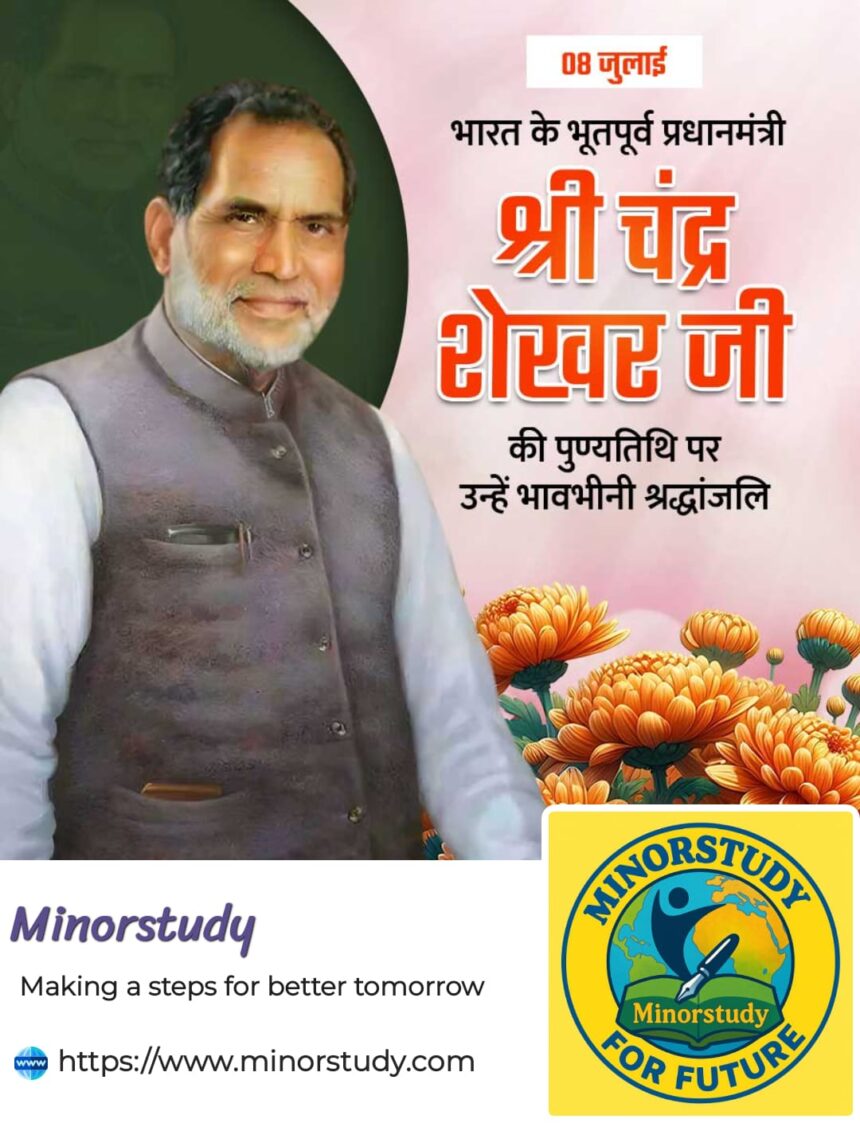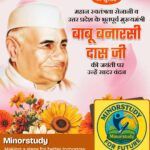7 Unshakable Truths About Shri Chandra Shekhar Ji – The Fearless Voice India Almost Forgot
Shri Chandra Shekhar Ji: In the ever-shifting landscape of Indian politics, certain leaders emerge not because of dynastic privilege or power-lust, but because of pure conviction, courage, and grassroots connect. Shri Chandra Shekhar Ji, fondly known as the “Young Turk” of Indian politics, was one such leader—bold, independent-minded, and deeply committed to the common man.
- 🧭 History of Shri Chandra Shekhar Ji
- 🗓️ Timeline of Key Events in His Life
- 📌 7 Important and Emotional Facts About Chandra Shekhar Ji
- 1. 🥼 Prime Minister Without a Party Majority
- 2. 🚶♂️ The Iconic Bharat Yatra
- 3. ⛓️ Imprisoned During Emergency
- 4. 📚 Avid Reader and Writer
- 5. 🛑 Refused to Compromise Ethics
- 6. 🏛️ Lived Simply, Died Poor
- 7. 🇮🇳 Defender of Indian Sovereignty
- ❓ Frequently Asked Questions (FAQs)
- Q1. When was Chandra Shekhar the Prime Minister of India?
- Q2. Why is he called the ‘Young Turk’?
- Q3. What was the Bharat Yatra?
- Q4. Why did he resign as Prime Minister?
- Q5. How is Chandra Shekhar remembered today?
- 🌟 Significance of Shri Chandra Shekhar Ji in Indian Society
- 🙌 Observance and Legacy in Public Memory
- 💡 Lessons from Chandra Shekhar’s Life – Human-Friendly Insights
- 🎉 Wishing You on the Remembrance of Chandra Shekhar Ji
- 📈 Daily Life Impact of His Leadership
- 📝 Important Points Recap
- 🕯️ Conclusion: A Forgotten Lion Who Roared Softly
His life was a reflection of simplicity, socialism, and strong principles, even when power was within his grasp. Though his tenure as Prime Minister of India was short-lived, his impact on Indian democracy, opposition politics, and leadership ethics was long-lasting.
Let’s explore in over 1200+ words, the history, timeline, facts, FAQs, life philosophy, significance, and humanly inspirational aspects of Shri Chandra Shekhar Ji in a tone that connects the heart and the mind.
🧭 History of Shri Chandra Shekhar Ji
Full Name: Chandra Shekhar Singh
Born: 17 April 1927, Ibrahimpatti village, Ballia district, Uttar Pradesh
Died: 8 July 2007, New Delhi
Education: MA in Political Science, Allahabad University
Profession: Politician, Social Activist
Notable Role: 8th Prime Minister of India (1990–1991)
Raised in a modest farming family, Chandra Shekhar’s early life was steeped in struggle, nationalist thought, and socialist ideology. He joined the Praja Socialist Party before moving to the Indian National Congress, where he was part of the Young Turks—a group that challenged the status quo and stood up to authoritarian tendencies, even within their own party.
🗓️ Timeline of Key Events in His Life
| Year | Event |
|---|---|
| 1927 | Born in Ballia, UP |
| 1951 | Joined politics with Praja Socialist Party |
| 1962 | Elected to Rajya Sabha |
| 1964 | Joined Indian National Congress |
| 1975–77 | Arrested during Emergency |
| 1977 | Became Member of Parliament, part of Janata Party |
| 1990 | Becomes Prime Minister of India (November 10) |
| 1991 | Resigned (June 21) after Congress withdrew support |
| 2007 | Passed away after battle with cancer |
📌 7 Important and Emotional Facts About Chandra Shekhar Ji
1. 🥼 Prime Minister Without a Party Majority
Chandra Shekhar became PM with the smallest coalition ever in Indian history, supported from outside by Congress. It showed his courage to lead in adversity, even when instability loomed large.
2. 🚶♂️ The Iconic Bharat Yatra
In 1983, he undertook a 6-month-long Bharat Yatra on foot, covering over 4,000 km across villages, to understand the people’s pain firsthand. No other national leader had done this after Gandhi Ji—showing his commitment to rural India.
3. ⛓️ Imprisoned During Emergency
He stood up to Indira Gandhi during the Emergency, despite being in the Congress party. He was jailed for months, proving that his voice could not be bought or silenced.
4. 📚 Avid Reader and Writer
Chandra Shekhar Ji was intellectually sharp and authored columns regularly. He edited the publication “Young Indian”, which became a voice for dissent and socialist thought.
5. 🛑 Refused to Compromise Ethics
He never chased power, didn’t use religion or caste to rise, and stood firm against corruption. He was often called the “Clean Man of Politics”—a rarity in his era.
6. 🏛️ Lived Simply, Died Poor
Despite becoming PM, he lived in modest government quarters, never amassed wealth, and had no major assets at his death. His honesty remains a beacon of public service ethics.
7. 🇮🇳 Defender of Indian Sovereignty
He took bold stands on foreign policy and was critical of India’s economic overdependence. Even in Parliament, he spoke against unfair American dominance, making him a true nationalist.
❓ Frequently Asked Questions (FAQs)
Q1. When was Chandra Shekhar the Prime Minister of India?
He served as the 8th Prime Minister of India from November 10, 1990, to June 21, 1991.
Q2. Why is he called the ‘Young Turk’?
Because he was part of a group of dynamic, socialist reformers in the Congress party who challenged old-school thinking and stood up for grassroots democracy.
Q3. What was the Bharat Yatra?
It was a padayatra (march on foot) across India to connect with real issues of the poor. He walked from Kanyakumari to Rajghat, engaging directly with villagers and farmers.
Q4. Why did he resign as Prime Minister?
His government collapsed after Congress under Rajiv Gandhi withdrew support, largely due to political disagreements and trust issues.
Q5. How is Chandra Shekhar remembered today?
He is remembered as a principled leader, freedom of expression advocate, and a politician who walked the talk.
🌟 Significance of Shri Chandra Shekhar Ji in Indian Society
Symbol of ethical politics in a corrupt age
Voice of opposition dignity and parliamentary integrity
Promoted grassroots socialism and rural development
Defended the Constitution during political crises
Inspired future leaders like Nitish Kumar and Lalu Prasad Yadav
🙌 Observance and Legacy in Public Memory
Though not as celebrated as some other Prime Ministers, his memory is preserved through speeches, writings, statues, and occasional debates in Parliament. His birth and death anniversaries are observed by socialist parties and some educational institutions in India.
💡 Lessons from Chandra Shekhar’s Life – Human-Friendly Insights
Stand up even if you’re alone – he showed courage in isolation.
Power without principles is worthless – he valued ethics more than office.
Walk with the people, not just speak to them – his Bharat Yatra is proof.
Fight injustice from within – even in his own party, he spoke truth to power.
Live simply so others may simply live – his lifestyle mirrored Gandhi’s ideals.
🎉 Wishing You on the Remembrance of Chandra Shekhar Ji
On this day, as we remember Shri Chandra Shekhar Ji, let’s wish:
🕊️ May our leaders be as brave and grounded as he was.
🧭 May we value integrity over image, principles over popularity.
🙏 May India always be guided by fearless, ethical minds like his.
Jai Hind! Vande Mataram!
📈 Daily Life Impact of His Leadership
Encourages youth to join politics without compromise
Promotes the idea that politics is for service, not survival
Challenges the public to demand cleaner leadership
Inspires grassroots activism and rural engagement
Reminds India that walking with the poor is greater than flying over them
📝 Important Points Recap
Born in 1927, died in 2007; Prime Minister in 1990
Socialist, anti-Emergency activist, and Bharat Yatra walker
Called the Young Turk for his reformist zeal
Died poor, lived with pride, remembered with love
True symbol of ethical, fearless Indian politics
🕯️ Conclusion: A Forgotten Lion Who Roared Softly
Shri Chandra Shekhar Ji life is a masterclass in conviction-based politics. He didn’t need the longest tenure or the biggest office to make the deepest impact. His voice was sharp, but his values were soft—blending the strength of a lion with the humility of a servant.
In an age of soundbites, may we listen to his silence. In a world of optics, may we remember his inner ethics. And in a time of political chaos, may we hold onto the fearless honesty of Chandra Shekhar Ji.








